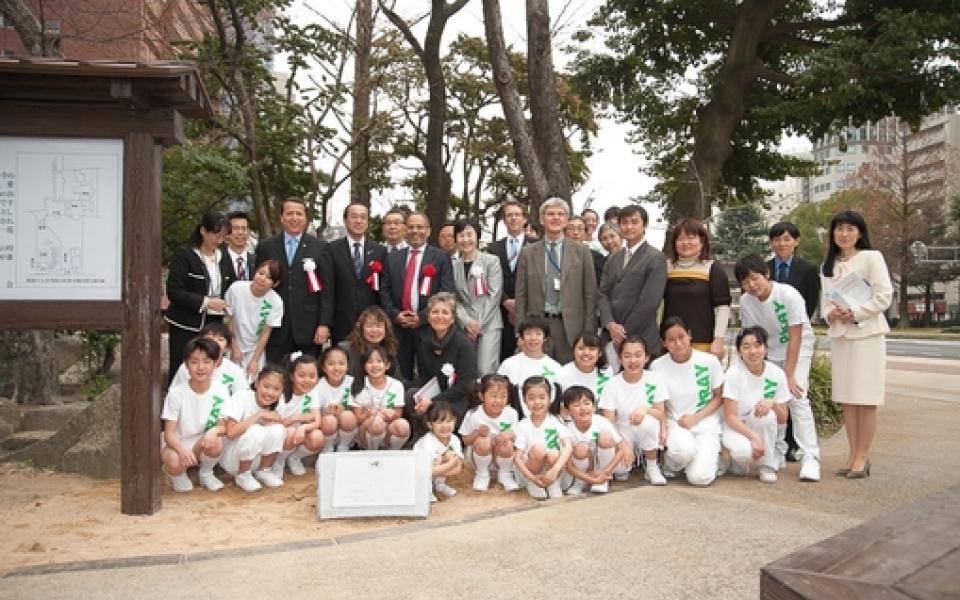
The story of the ANT-Hiroshima CC (ANT standing for “Asian Network of Trust), a global relief and peacebuilding NGO based in Hiroshima, Japan, is also a story of how one’s personal passions can spread to the thousands, if not millions, of others—it’s the story of ANT founder Tomoko Watanabe, the daughter of A-bomb survivors, who struck up a unique partnership with Regional Director of URI Africa, Mussie Hailu. And it’s the story of how, piece by piece and network by network, ANT-Hiroshima has been able to provide peacebuilding and relief work to a number of countries including Afghanistan, Pakistan, Nepal, and the Philippines.
Tomoko Watanabe was born in Hiroshima, Japan, just eight years after the atomic bombing. In a report about ANT, Tomoko expresses how she came to learn more about the culture of survival she had been born into. A world that her father describes when he talks about donating oil to treat the burns of survivors: “There was nothing we could do but keep on going, keep on living.”
ANT-Hiroshima was born out of Tomoko’s investigation into this culture, and her determination to help survivors suffering from similar atrocities all over the world. In her report, Tomoko writes: “The more familiar I became with Hiroshima’s A-bomb experience, the more profound its meaning grew. I came to feel that I wanted Hiroshima to be at the heart of my work for the rest of my life,” she says. “And ever since, hand in hand with many others, I have pursued activities which I hope can impact people’s lives for the better while spreading Hiroshima’s spirit of peace.”
It’s been 25 years since Tomoko started ANT-Hiroshima; she now acts as executive director. ANT has grown to include 100 members of various faiths including Buddhist, Christian, Muslim, Jewish, and Shinto.
When asked what words of wisdom Tomoko could offer to those doing disaster relief work, Tomoko says, “To effectively serve those in need, we must listen very closely to what their needs truly are, show respect for their cultural ways, and work together with the local people as equals.”
The “T” in ANT, standing for “Trust,” is also a strong component of the organization’s work.
“Building a foundation of trust is essential to the success and sustainability of any project,” Tomoko says. “At the same time, more broadly, trust is a prerequisite for peace itself. Building trust with any community is challenging, and toward this end, the key ingredients are time, patience, and dependability.”
In 2009, Ambassador and URI Regional Director of Africa Mussie Hailu traveled from Ethiopia to Nagasaki to attend the Mayors for Peace 7th General Conference. His visit included a trip to Hiroshima as well, where he was able to meet Tomoko and express solidarity with the people of both townships for the abolition of nuclear weapons.
During the visit, Tomoko also asked Mussie to represent ANT-Hiroshima in Africa. Tomoko was introduced to the work of URI and decided that ANT-Hiroshima should become a Cooperation Circle. Mussie later returned to Addis Ababa to spread the word about ANT’s work, with a copy of Sadako’s Prayer, a children’s book published by ANT, that tells the true story of a schoolgirl who contracted leukemia after surviving the atomic bomb.
In its 25 years of peacebuilding, ANT has donated thousands of copies of Sadako’s Prayer throughout the world, produced films about A-bomb survivors, held education and peace events, and planted the seeds of A-bombed trees throughout the world, among all of its many disaster relief projects.
Retelling stories of suffering may seem like difficult work for some, but for Tomoko, it seems to be critical; and at the heart of ANT’s work.
“Stories of suffering are very important to continue sharing for two reasons,” Tomoko says. “These stories enable present and future generations to honor the victims of suffering, and serve as a sharp reminder for us to work hard to prevent such suffering from occurring again. These stories can give hope and encouragement to others faced with suffering of their own.”
To read Tomoko Watanabe’s report about ANT-Hiroshima that includes her personal mission statement, “Spreading Hiroshima’s Spirit of Peace,” click here.
